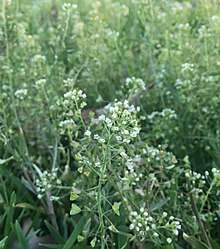Capsella (plant)
Capsella is a genus of herbaceous plant and biennial plants in the family Brassicaceae.[1] It is a close relative of Arabidopsis, Neslia, and Halimolobos.[2]
| Capsella | |
|---|---|
 | |
| Shepherd's purse (Capsella bursa-pastoris) | |
| Scientific classification | |
| Kingdom: | Plantae |
| Clade: | Tracheophytes |
| Clade: | Angiosperms |
| Clade: | Eudicots |
| Clade: | Rosids |
| Order: | Brassicales |
| Family: | Brassicaceae |
| Genus: | Capsella Medik. |
| Species | |
|
See text | |
Some recent authors circumscribe Capsella to contain only three species: Capsella bursa-pastoris, Capsella rubella and Capsella grandiflora.[2]
Capsella rubella is a self-fertilizing species that became self-compatible 50,000 to 100,000 years ago. Its outcrossing progenitor was Capsella grandiflora. In general, the shift from outcrossing to self-fertilization is among the most common transitions in flowering plants. Capsella rubella is studied as a model for understanding the evolution of self-fertilization.[3][4]
The name is said to derive from Latin capsa, a box or case, alluding to fruit resembling a medieval wallet or purse;[5] the suffix -ella denotes "lesser".[6]
Species
- Capsella abscissa
- Capsella andreana
- Capsella australis
- Capsella austriaca
- Capsella bursa-pastoris (shepherd's purse)
- Capsella divaricata
- Capsella draboides
- Capsella gracilis
- Capsella grandiflora
- Capsella humistrata
- Capsella hybrida
- Capsella hyrcana
- Capsella integrifolia
- Capsella lycia
- Capsella mexicana (syn. Bursa mexicana)
- Capsella orientalis
- Capsella pillosula
- Capsella pubens
- Capsella puberula
- Capsella rubella (red shepherd's purse)
- Capsella schaffneri (syn. Asta schaffneri)
- Capsella stellata
- Capsella tasmanica
- Capsella thomsoni
- Capsella thracica
- Capsella viguieri
- Capsella villosula
References
- "19. Capsella Medikus". Flora of China.
- Slotte, T.; Ceplitis, A.; Neuffer, B.; Hurka, H.; Lascoux, M. (2006). "Intrageneric phylogeny of Capsella (Brassicaceae) and the origin of the tetraploid C. bursa-pastoris based on chloroplast and nuclear DNA sequences". American Journal of Botany. 93 (11): 1714–1724. doi:10.3732/ajb.93.11.1714. PMID 21642116.
- Brandvain Y, Slotte T, Hazzouri KM, Wright SI, Coop G (2013). "Genomic identification of founding haplotypes reveals the history of the selfing species Capsella rubella". PLOS Genet. 9 (9): e1003754. doi:10.1371/journal.pgen.1003754. PMC 3772084. PMID 24068948.
- Slotte T, Hazzouri KM, Ågren JA, Koenig D, Maumus F, Guo YL, Steige K, Platts AE, Escobar JS, Newman LK, Wang W, Mandáková T, Vello E, Smith LM, Henz SR, Steffen J, Takuno S, Brandvain Y, Coop G, Andolfatto P, Hu TT, Blanchette M, Clark RM, Quesneville H, Nordborg M, Gaut BS, Lysak MA, Jenkins J, Grimwood J, Chapman J, Prochnik S, Shu S, Rokhsar D, Schmutz J, Weigel D, Wright SI (July 2013). "The Capsella rubella genome and the genomic consequences of rapid mating system evolution". Nat. Genet. 45 (7): 831–5. doi:10.1038/ng.2669. PMID 23749190.
- "Capsella". Flora of North America. efloras.org. Retrieved 16 June 2020.
- Gledhill, D. (1985). The names of plants. Cambridge University Press. p. 82. ISBN 0521305497.